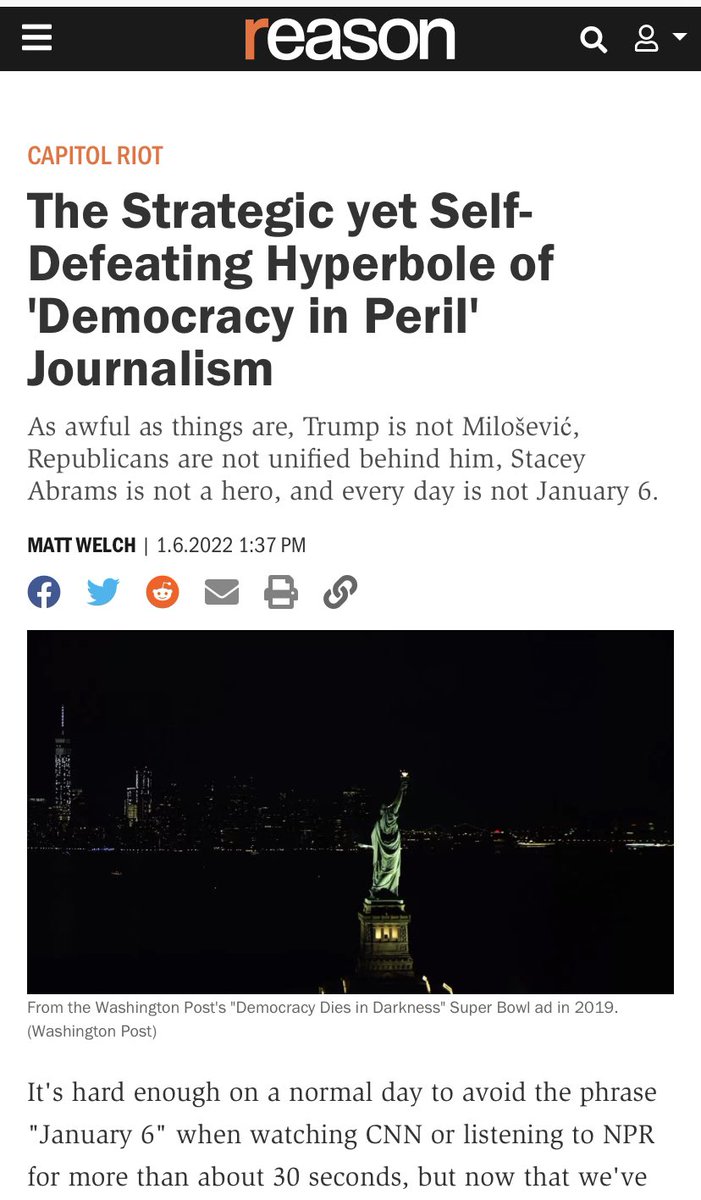
Last week, some rightwing media misrepresented something I posted on Twitter as evidence of liberal hysteria - yet another woke professor proving how illiberal the Left really is. What else is new?! But: What they said is actually quite revealing. So, here are some thoughts: 







Both “Reason” and the “Washington Examiner” targeted a relatively innocuous thread in which I praised the recent “Every day is Jan. 6 now” intervention by the NYT editorial board, but also criticized the paper for not really following that maxim in any consistent way.
https://twitter.com/tzimmer_history/status/1478563055613186050
According to these rightwing outlets, what I wrote was a manifestation of deranged alarmism, typical liberal hysteria – an outrageously illiberal attack on all conservatives, an undemocratic call to deplatform and boycott all politicians of a major party. 







Here’s that argument again, by the same person who wrote the WashEx critique.
Well, I guess we can imagine a world in which this is plausible – but it’s not the one in which we live. Over here, there is only one pro-democracy party and one that is embracing authoritarianism.
Well, I guess we can imagine a world in which this is plausible – but it’s not the one in which we live. Over here, there is only one pro-democracy party and one that is embracing authoritarianism.

Likewise, I was not attacking “conservatism” as an abstract principle, or “traditional hierarchies” in a vacuum. I was referring to conservatism as a political project, in the aftermath of Jan. 6, in the specific context of an accelerating onslaught on democracy from the Right.
https://twitter.com/tzimmer_history/status/1473659077616181257
In this context, what are those “traditional hierarchies”? We’re not talking about “family values” or “Christian traditions” in the abstract – but about the project to keep white men in charge at the expense of everyone else. That’s at the core of the current political conflict.
Most importantly: I’m not saying “If you are attached to traditional hierarchies, you are anti-democratic” - I’m saying: If you insist on upholding those traditional hierarchies *against the will of the majority* and by authoritarian measures, you are anti-democratic. 

So yes, you got me: I am indeed arguing that conservative politicians, intellectuals, and activists who reject the results of democratic elections and are fundamentally unwilling to accept the need to deliberate and compromise in a pluralistic society are a threat to democracy.
https://twitter.com/tzimmer_history/status/1466776972860788741
The reality that too many conservative commentators either don’t want to acknowledge or actively seek to obscure is that modern conservatism - not as an abstract body of thought, but as a concrete political project – has always been defined by anti-democratic tendencies.
The Republican Party has been on an anti-democratic trajectory since modern conservatism became the animating force within the GOP in the final third of the twentieth century, causing the party to focus almost exclusively on the interests and sensibilities of white conservatives.
As the country has become less white, less Christian, and more pluralistic over time due to demographic and cultural changes, these long-standing tendencies have radicalized to the point where the Republican Party has openly embraced authoritarianism.
So, no, “If Republicans win, democracy loses” is not “ironic,” but simply a realistic assessment of where we are. No measure of willful ignorance, bad-faith misrepresentation, or aggressive anti-anti-Trumpism will change that. 

• • •
Missing some Tweet in this thread? You can try to
force a refresh




